2023 Stanford Ecopreneurship Annual Report
Message from the Directors
Launching Stanford Ecopreneurship programs at record speed in 2023 has been an exciting and inspiring experience. We are delighted to share key program accomplishments from our inaugural year as well as a preview of what’s to come in 2024. It has never been more important to create and bring to market scalable solutions to the sustainability crisis, and we are pleased to be supporting a new generation of sustainability-focused entrepreneurs through a robust set of courses, co-curricular programs, and grants.
Featured below are some of the emerging ecopreneurs benefiting from the programs’ structured pathways of support—in some cases to accelerate the development of their own ecoventures, and in other cases to deepen and enrich their entrepreneurial thinking as it applies to varied career paths leading the transition to a more sustainable world.
Just like our budding ecopreneurs, we are maintaining a prototyping mindset and will continue to iterate and expand the Stanford Ecopreneurship offerings to ensure that we are creating meaningful, accessible pathways of support. The generous gift from the Benioff Ecopreneur Fund is enabling us to design and launch programs to inspire and support ecopreneurship across Stanford and beyond.
With gratitude,
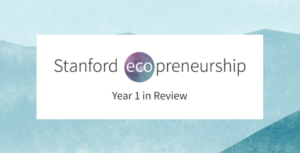 ** Internal Note: Easily save the open graph image associated with a published web article by using the LinkedIn Post Inspector tool. **
** Internal Note: Easily save the open graph image associated with a published web article by using the LinkedIn Post Inspector tool. **
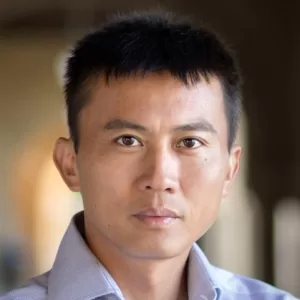
Yi Cui
Fortinet Founders Professor of Engineering; Professor of Materials Science and Engineering; and Faculty Director of the Sustainability Accelerator and the Precourt Institute for Energy
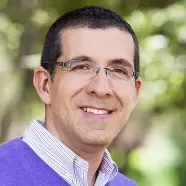
Stefanos Zenios
The Investment Group of Santa Barbara Professor of Entrepreneurship; Professor of Operations, Information & Technology; and Faculty Director of the Center for Entrepreneurial Studies
Creating Pathways of Support
Keegan Cooke, Director of Stanford Ecopreneurship, discusses the support and education structures available to students exploring ecopreneurship.
Stanford Ecopreneurship programs support ecopreneurs across four objectives:

Enrich
ecopreneurial capacity with skills and contextual awareness

Discover
sustainability challenges and ecopreneurial opportunities

Evaluate
viability of the ecoventure ideas

Accelerate
development of ecoventures
2023 Program Introduction
In our inaugural year of programming, we saw a wide variety of projects and ecopreneurial backgrounds coming into our support pathways. We met the students where they were in their learning journeys and supported them in their development, helping future sustainability leaders build the capacity to tackle complex challenges.
Stanford Impact Founder in Ecopreneurship Fellowships and Prizes
(SIF-Eco)
The SIF-Eco Fellows are provided $110,000 in funding along with advising support to fellows who want to start a high-impact for-profit or nonprofit venture that addresses a pressing environmental need. In 2023, we selected four fellows and awarded prizes to four additional finalists who are tackling challenges of palm oil production, aviation, and regenerative agriculture, all of which feature complicated interactions of various stakeholders.
And Battery Aero is developing battery systems to decarbonize heavy transportation, starting with aviation.
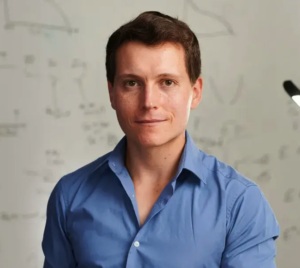
ElectroSan has developed a technology for extracting ammonia from wastewater.
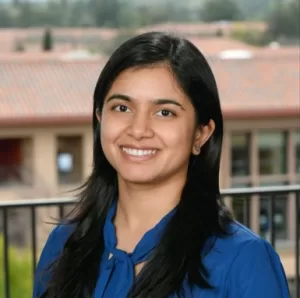
Vatio is a solar-in-a-box solution that can be plugged into a standard home outlet to reduce electricity costs from day one.
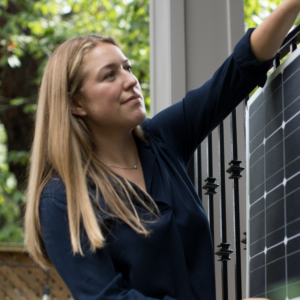
Summer Ecopreneurial Immersion
(Eco-SEI)
The Eco-SEI program offers Stanford graduate students an experiential learning opportunity to evaluate a sustainability-focused venture idea over the summer. This year, 16 participants evaluated ecoventure ideas, representing 10 countries and 13 industries—from manufacturing sustainable cement, to improving water risk analysis for farmers, to sustainability education programming for high schoolers.
Ecoprenuerial Summer Internship Program
(Eco-SIP)
Eco-SIP provides Stanford graduate students the ability to test their fit with an ecopreneurial career path by interning at an early-stage, sustainability-focused company for the summer. This year, 10 students learned everything from issues in sustainable supply chains, to more broadly experiencing the rollercoaster lifestyle of scaling a startup first-hand. We expect to see applications to all three co-curricular programs continue to increase over time.
Savannah worked at a startup offering an app-based marketplace that strives to eliminate retail food waste by connecting consumers with discounted food nearing its best-by date.
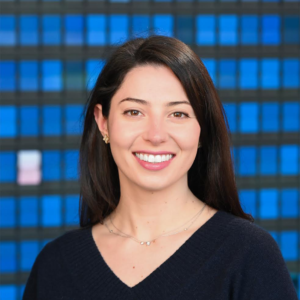
Educating Beyond the Classroom
Adelaide Renee Coman, Associate Director, Co-Curricular Ecopreneurship Programs, on Stanford Ecopreneurship’s First Year
Looking Ahead
We have exciting plans in the pipeline, with a focus on exploring the following initiatives over the next year:
- Increase the capacity of our co-curricular programs to meet growing student demand
- Expand ecopreneurship classes and curriculum across the university
- Launch initial offerings for ecopreneurs beyond Stanford


